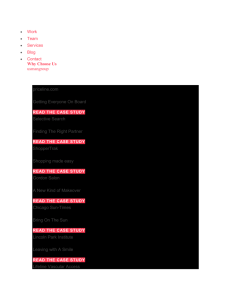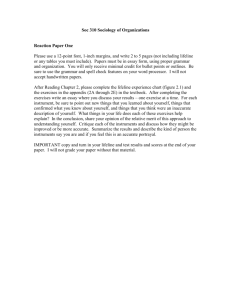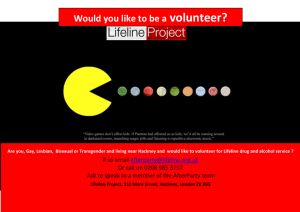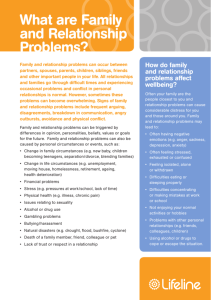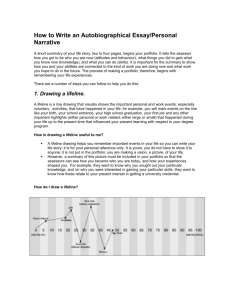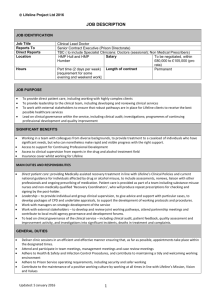Lifeline 2016 Syllabus - FAU Lifeline: Biological Principles
advertisement
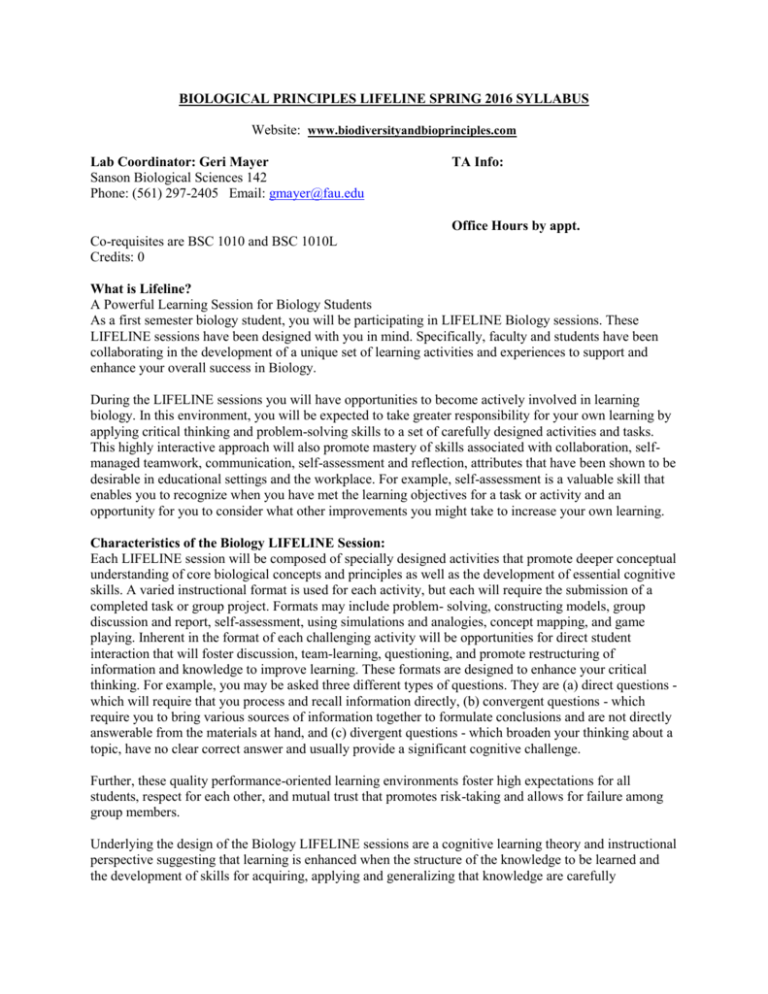
BIOLOGICAL PRINCIPLES LIFELINE SPRING 2016 SYLLABUS Website: www.biodiversityandbioprinciples.com Lab Coordinator: Geri Mayer Sanson Biological Sciences 142 Phone: (561) 297-2405 Email: gmayer@fau.edu TA Info: Office Hours by appt. Co-requisites are BSC 1010 and BSC 1010L Credits: 0 What is Lifeline? A Powerful Learning Session for Biology Students As a first semester biology student, you will be participating in LIFELINE Biology sessions. These LIFELINE sessions have been designed with you in mind. Specifically, faculty and students have been collaborating in the development of a unique set of learning activities and experiences to support and enhance your overall success in Biology. During the LIFELINE sessions you will have opportunities to become actively involved in learning biology. In this environment, you will be expected to take greater responsibility for your own learning by applying critical thinking and problem-solving skills to a set of carefully designed activities and tasks. This highly interactive approach will also promote mastery of skills associated with collaboration, selfmanaged teamwork, communication, self-assessment and reflection, attributes that have been shown to be desirable in educational settings and the workplace. For example, self-assessment is a valuable skill that enables you to recognize when you have met the learning objectives for a task or activity and an opportunity for you to consider what other improvements you might take to increase your own learning. Characteristics of the Biology LIFELINE Session: Each LIFELINE session will be composed of specially designed activities that promote deeper conceptual understanding of core biological concepts and principles as well as the development of essential cognitive skills. A varied instructional format is used for each activity, but each will require the submission of a completed task or group project. Formats may include problem- solving, constructing models, group discussion and report, self-assessment, using simulations and analogies, concept mapping, and game playing. Inherent in the format of each challenging activity will be opportunities for direct student interaction that will foster discussion, team-learning, questioning, and promote restructuring of information and knowledge to improve learning. These formats are designed to enhance your critical thinking. For example, you may be asked three different types of questions. They are (a) direct questions which will require that you process and recall information directly, (b) convergent questions - which require you to bring various sources of information together to formulate conclusions and are not directly answerable from the materials at hand, and (c) divergent questions - which broaden your thinking about a topic, have no clear correct answer and usually provide a significant cognitive challenge. Further, these quality performance-oriented learning environments foster high expectations for all students, respect for each other, and mutual trust that promotes risk-taking and allows for failure among group members. Underlying the design of the Biology LIFELINE sessions are a cognitive learning theory and instructional perspective suggesting that learning is enhanced when the structure of the knowledge to be learned and the development of skills for acquiring, applying and generalizing that knowledge are carefully interwoven. Research has shown that students who work together learn more, understand more, remember more and acquire essential skills. Attendance and Make-Up Policy: Attendance is required and mandatory. All students are allowed 2 unexcused absences in Lifeline. For each unexcused absence over 2, there will be a 2% deduction from your lecture course points. There is a total of 450 points in lecture, so a 2% deduction will result in a subtraction of 9 points. For example, if a student has 5 unexcused absences in Lifeline, they have 3 unexcused absences above the allowed 2, and will lose a total of 27 points from their lecture total (3 unexcused absences x 9 points = 27 point deduction). Keep in mind, lifeline absences are separate from lecture absences. Students are allowed 2 unexcused absences for lifeline and 2 unexcused absences for lecture. For example, if a student has 3 unexcused absences in lifeline over the allowed 2 (27 point deduction) and 3 unexcused absences over the allowed 2 in lecture (27 points), there will be a total deduction of 54 points from lecture points. You are permitted to make up a maximum of 2 Lifeline classes in order to obtain missed points, and make-ups must be done within the same week. Even if a Lifeline class is made-up in the same week, it will still count as an unexcused absence. The benefit of making up the class is to acquire the points for that week. All Lifeline sessions are held in SC 143. When making up a Lifeline class, you must fill out BOTH a pink slip and sign the sign-in sheet. Pink slips and a list of all the Lifeline sessions are posted outside Lifeline room door as well as on the Moodle website. If you have an excused absence, proper documentation must be given to Geri Mayer (Lab Coordinator) within one week of the missed lifeline session (SC142). Absences due to religious holidays are considered excused absences and must be made up the same week in order to acquire points for that week. Punctuality is important and could seriously affect your grade. If you are 10 minutes late or later to a Lifeline class, you will not be allowed to attend that Lifeline session and it will count as an unexcused absence. If you are late to class, but within the 10 minute time limit, it is at your T.A.’s discretion to deduct points from your grade. Please be on time for class! Grading Policy: Lifeline is worth 60 points of your lecture grade. Lifeline in-class activities, quizzes, homework and PPP (punctuality, participation, and performance) will count for 35 points. The Moodle project is worth 25 points. Lifeline points are not extra credit points and not attending Lifeline sessions will result in failure of the lecture. Cell phone use is not permitted during Lifeline. PPP points can be deducted at the T.A.’s discretion for cell phone use during class. This includes texting! Moodle Project: This project, run through the Lifeline discussion sessions at FAU, is a collaborative project that is being run concurrently for comparison at three other universities (Ohio University, University of Miami, and James Madison University, as well as FAU). In this group project, you will use Web 2.0 interactive webbased communication and information sharing, the technologies you use every day when you email, text, blog, chat, post images online, to engage in a group project using visual media found on the internet that relates to and describes the contents of the Biodiversity course. The visual images that you upload will then be used to compile a group image-based concept map that you will construct online and will be critiqued by a group of your peers, as well as graded by your Lifeline T.A. Some of the points associated with this project are individual, and others are earned as a group. This project is a required element of Lifeline and not an optional assignment. Your participation is imperative to the success of this project and ultimately your grade. Cheating is a serious offense. If you are caught cheating in any way, you will be referred to the lab coordinator and the Dean of Student Services for the College of Science. We have a ZERO tolerance for cheating. Consult the academic honor code for the university. For more information see the Code of Academic Integrity in the University Regulations on the FAU website. Plagiarism: Plagiarism is a serious offense and it will not be tolerated (see below). Plagiarism is defined as the presentation of words or ideas from any other source (including the internet) as one’s own. The penalty for plagiarism in lifeline will be the deduction of 50 points from the lecture grade for each incident. Code of Academic Integrity: Students at Florida Atlantic University are expected to maintain the highest ethical standards. Academic dishonesty is considered a serious breach of these ethical standards, because it interferes with the university mission to provide a high quality of education in which no student enjoys an unfair advantage over any other. Academic dishonesty is also destructive of the university community, which is grounded in a system of mutual trust and places high value on personal integrity and individual responsibility. Harsh penalties are associated with academic dishonesty. For more information, see University regulation 4.001. http://www.fau.edu/ctl/4.001_Code_of_Academic_Integrity.pdf Lifeline Spring 2016 Schedule Week/Date Lecture Topic Text Chapter Lab Chapter Lifeline Topic Campbell 8th Scientific 1/11-1/15 Bio Concepts Ed. Chapter 1 Method Lifeline Policies Drop/adds ends Friday, January 15th at 5:00pm Macromolecule 1/18-1/22 Descent/Phylogeny Chapter 22, 26 s Chemistry 1/18 Martin Luther King Day Monday Students MUST attend any lifeline T-F Chemistry of Life 1/25-1/29 Water Chapter 2, 3 Cell Structures Functional Groups Exam 1 Carbon Compounds Experimental 2/1 - 2/5 Macromolecules Chapter 4, 5 Design The Cell Osmosis Movement *Draw 2/8 - 2/12 The Cell Chapter 6 Diffusion Topics 2/15 - 2/19 Cell Membrane Chapter 6, 7 2/22 - 2/26 Metabolism Respiration 2/29 - 3/4 Photosynthesis 3/7 - 3/11 Spring Break Exam 2 3/14 - 3/18 Cell Cycle/Meiosis Chapter 8 3/21 - 3/25 Reproduction 3/28 - 4/1 Enzymes Cellular Respiration Chapter 9, 10 N/A Photosynthesis N/A Sea Urchin Chapter 12, 13 Fertilization Stem Cells Chapter 13, 46 Planaria Development Chapter 47 Genetics Exam 3 4/4 - 4/8 DNA/Genetics Chapter 14, 15 DNA/Forensics LAST DAY TO DROP W/O AN 'F' IS APRIL 8TH Final Exam 4/11 - 4/15 Chromosomes Chapter 15, 16 4/18 - 4/22 Molecular Genetics Chapter 16, 17 N/A 4/26 - 4/27 Reading Days N/A N/A 4/28 - 5/4 Finals N/A N/A Moodle Assignment Individual Profile Pic Due Due: Pic & 200 Word Abstract Respiration Photosynthesis *Presentations N/A 7 Minute Presentations N/A Mitosis Meiosis *Presentations Basic Genetics 7 Minute Presentations/AL Moodle Survey Due Advanced Genetics Genetic Code N/A N/A N/A N/A
